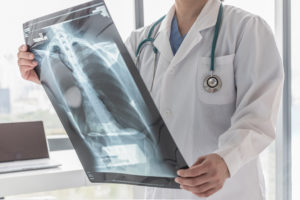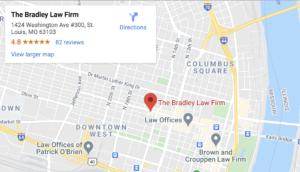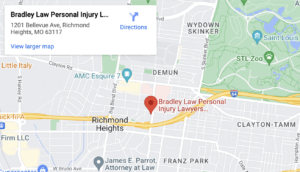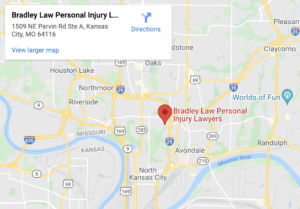
Your chest includes the musculoskeletal structures that enclose and protect your chest cavity. Chest trauma happens frequently since car accidents and slip and fall accidents often involve an impact on your chest.
A chest injury can keep you out of work for weeks or even months. Worse yet, the trauma that caused your chest injury can damage the vital organs inside your chest cavity.
Here are some facts to know about chest injuries and the compensation you can seek for a chest injury.
Overview of Your Chest
Doctors often refer to your chest as your thorax. “Thorax” is a scientific term that identifies the section of your body between your head and abdomen. The thorax defines, encloses, and protects the thoracic cavity and the vital organs inside it.
Your thorax starts at your shoulders and ends at your diaphragm. The diaphragm sits below your lungs and expands your thoracic cavity to help you breathe. It also separates your thoracic cavity from your abdominal cavity.
Your chest wall surrounds your chest cavity. The structure of the chest wall comes from your rib cage. You have 12 pairs of ribs. Each rib fits into a joint in your spine. Ligaments hold the ribs to the thoracic vertebrae.
The top seven ribs on each side are the true ribs. These ribs attach to the sternum through cartilage.
The next three ribs on each side are the false ribs. These ribs attach with cartilage to the true ribs rather than the sternum.
The bottom two ribs on each side are the floating ribs. These ribs attach to the spine but have no attachment at their other end.
Intercostal muscles sit between the ribs. These muscles help expand your chest when you breathe.
Muscles, such as your pectoral muscles, also sit over your ribs. These muscles help you move your arms, bend and twist your body, and carry your upper body weight. These muscles anchor to your ribs, spine, collarbones, and shoulder blades.
What are the Causes of Chest Injuries?
Chest injuries can result from almost any accident that involves chest trauma. Two causes of chest injuries include:
Blunt Force Trauma
Blunt force trauma happens when your chest gets hit by a force that does not penetrate the chest wall. A seat belt injury during a car accident would cause blunt force trauma.
Penetrating Trauma
Penetrating trauma happens when something penetrates the chest wall. Penetrating trauma not only damages your chest tissue but also threatens your vital organs.
What are Some Examples of Chest Injuries?
Chest injuries can take many different forms depending on the tissue damaged. Some examples of chest injuries include:
Strained or Sprained Chest
A strained chest happens when the muscles or tendons of the chest get stretched or torn. Symptoms of a strained chest include:
- Pain
- Inflammation
- Stiffness
- Muscle spasms
- Weakness
A sprained chest occurs when you stretch or tear the ligaments in your chest. For example, you could sprain your chest when the ligaments holding your ribs to your spine get stretched or torn.
Symptoms of a sprained chest include:
- Pain
- Inflammation
- Joint instability
- Limited range of motion
- Bruises
A sprain or strain will usually heal in four to six weeks without surgery. Your doctor will probably prescribe rest, ice, and anti-inflammatory drugs.
Dislocated Rib
A dislocated rib happens when a rib moves due to a ligament sprain in your back or torn cartilage in your front. When the rib moves out of place, it can press on nearby nerves, producing pain and nerve inflammation.
The rib will usually heal on its own with rest and anti-inflammatory drugs. Once the swelling subsides, the rib can move back into place. Over time, the ligament or cartilage will heal.
Fractured Rib
Ribs can fracture when they get hit with a powerful force. Most fractured ribs will hurt, particularly when breathing, but will not cause any further problems.
Occasionally, a fractured rib will puncture the chest wall and endanger the vital organs. And if a rib fractures into three or more pieces, you can develop a condition called flail chest. This condition can kill you if you do not receive emergency treatment.
Chest Injury Complications
Chest injuries can often cause complications beyond the damage to your chest wall. Specifically, a chest injury can damage your vital organs.
Collapsed Lung
A chest injury that penetrates your chest wall can cause a collapsed lung. A collapsed lung happens when air or fluid gets between the chest wall and your lungs. Your lungs need a vacuum to inflate with air. When air or fluid gets into the thoracic cavity, it presses on your lungs and prevents them from inflating.
When air fills your chest cavity, you have a pneumothorax. When blood fills your chest cavity, you have a hemothorax. Both conditions can kill you if you do not receive emergency treatment to empty the chest cavity so your lung can reinflate.
Cardiac Tamponade
A membrane called the pericardium surrounds your heart. This membrane protects the heart from infections. It also prevents your other organs and blood vessels from rubbing against the heart as it beats.
If a chest injury causes internal bleeding, your pericardium can fill with blood. The blood can inhibit the heart from beating freely. As the pericardium fills with blood, it can strangle the heart, causing death.
How Do I Get Compensation for a Chest Injury?
To get workers’ compensation for a chest injury, you must show that you suffered the injury during the course and scope of your job duties. Workers’ comp benefits include full medical benefits and partial disability benefits.
To recover damages for a non-work-related chest injury, you must prove your chest injury resulted from the negligent actions of someone else. This means the at-fault party failed to exercise reasonable care, and you suffered a chest injury as a result.
You can recover economic and non-economic damages if you can prove negligence. Economic damages include your medical costs and lost income. Non-economic damages include your pain and suffering, and reduced enjoyment of life.
Contact a St. Louis Personal Injury Lawyer for Help
A chest injury can leave you physically unable to work or even meet your daily needs. It can also lead to life-threatening complications. Contact our personal injury attorneys to discuss your chest injury and the compensation you can seek for it.




